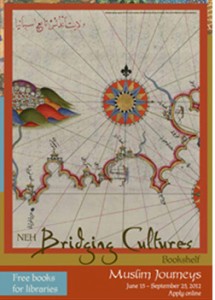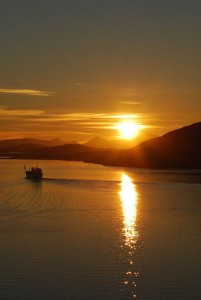Wed, 07/30/2014 - 3:28pm

Since our Muslim Journeys series began at SPL, I've been reading quite a  bit about Islamic history and culture and taking note of events in the Islamic calendar. As with Christianity and Judaism, the Islamic year is based on a lunar calendar. Ramadan, the period when Muslims must fast between sunrise and sunset, ended recently. A writer for The Atlantic brought up an issue that had never occurred to me: how can Muslims be expected to fast between sunrise and sunset in a place where the sun is up for twenty hours?
Our planet tilts substantially over the course of the year and in the northern hemisphere's summer months the northernmost parts of the planet are tilted toward the sun. So in countries such as Canada, Finland, Norway and
bit about Islamic history and culture and taking note of events in the Islamic calendar. As with Christianity and Judaism, the Islamic year is based on a lunar calendar. Ramadan, the period when Muslims must fast between sunrise and sunset, ended recently. A writer for The Atlantic brought up an issue that had never occurred to me: how can Muslims be expected to fast between sunrise and sunset in a place where the sun is up for twenty hours?
Our planet tilts substantially over the course of the year and in the northern hemisphere's summer months the northernmost parts of the planet are tilted toward the sun. So in countries such as Canada, Finland, Norway and  Sweden, there are times when the sun is still up at midnight. Most of us can't go without food or liquids for twenty hours and still function, so on the face of it an observant Muslim in say, Tromso, Norway, or Juneau, Alaska, has a big problem. Fortunately there's a fatwah (clerical decree)* that states that Muslims in the lands of the midnight sun can observe the timetable of the nearest Islamic country, or the timetable in Mecca. So if the sun sets at 8 pm in Mecca, then Muslims in Norway or Iceland can break their fast at 8 pm local time (even if the sun's going to be up another 4 hours).
Ramadan actually ended yesterday with the feast of Eid al-Fitr. Here's a great photo gallery of celebrations worldwide courtesy of the BBC.
*Contrary to what most non-Muslims might think, the word fatwah does not mean an order to kill someone, although unfortunately a fatwah can be an order to kill someone (as in the case of Salman Rushdie). The word simply means a ruling on a point of Islamic law by recognized authorities.
Sweden, there are times when the sun is still up at midnight. Most of us can't go without food or liquids for twenty hours and still function, so on the face of it an observant Muslim in say, Tromso, Norway, or Juneau, Alaska, has a big problem. Fortunately there's a fatwah (clerical decree)* that states that Muslims in the lands of the midnight sun can observe the timetable of the nearest Islamic country, or the timetable in Mecca. So if the sun sets at 8 pm in Mecca, then Muslims in Norway or Iceland can break their fast at 8 pm local time (even if the sun's going to be up another 4 hours).
Ramadan actually ended yesterday with the feast of Eid al-Fitr. Here's a great photo gallery of celebrations worldwide courtesy of the BBC.
*Contrary to what most non-Muslims might think, the word fatwah does not mean an order to kill someone, although unfortunately a fatwah can be an order to kill someone (as in the case of Salman Rushdie). The word simply means a ruling on a point of Islamic law by recognized authorities.
 bit about Islamic history and culture and taking note of events in the Islamic calendar. As with Christianity and Judaism, the Islamic year is based on a lunar calendar. Ramadan, the period when Muslims must fast between sunrise and sunset, ended recently. A writer for The Atlantic brought up an issue that had never occurred to me: how can Muslims be expected to fast between sunrise and sunset in a place where the sun is up for twenty hours?
Our planet tilts substantially over the course of the year and in the northern hemisphere's summer months the northernmost parts of the planet are tilted toward the sun. So in countries such as Canada, Finland, Norway and
bit about Islamic history and culture and taking note of events in the Islamic calendar. As with Christianity and Judaism, the Islamic year is based on a lunar calendar. Ramadan, the period when Muslims must fast between sunrise and sunset, ended recently. A writer for The Atlantic brought up an issue that had never occurred to me: how can Muslims be expected to fast between sunrise and sunset in a place where the sun is up for twenty hours?
Our planet tilts substantially over the course of the year and in the northern hemisphere's summer months the northernmost parts of the planet are tilted toward the sun. So in countries such as Canada, Finland, Norway and  Sweden, there are times when the sun is still up at midnight. Most of us can't go without food or liquids for twenty hours and still function, so on the face of it an observant Muslim in say, Tromso, Norway, or Juneau, Alaska, has a big problem. Fortunately there's a fatwah (clerical decree)* that states that Muslims in the lands of the midnight sun can observe the timetable of the nearest Islamic country, or the timetable in Mecca. So if the sun sets at 8 pm in Mecca, then Muslims in Norway or Iceland can break their fast at 8 pm local time (even if the sun's going to be up another 4 hours).
Ramadan actually ended yesterday with the feast of Eid al-Fitr. Here's a great photo gallery of celebrations worldwide courtesy of the BBC.
*Contrary to what most non-Muslims might think, the word fatwah does not mean an order to kill someone, although unfortunately a fatwah can be an order to kill someone (as in the case of Salman Rushdie). The word simply means a ruling on a point of Islamic law by recognized authorities.
Sweden, there are times when the sun is still up at midnight. Most of us can't go without food or liquids for twenty hours and still function, so on the face of it an observant Muslim in say, Tromso, Norway, or Juneau, Alaska, has a big problem. Fortunately there's a fatwah (clerical decree)* that states that Muslims in the lands of the midnight sun can observe the timetable of the nearest Islamic country, or the timetable in Mecca. So if the sun sets at 8 pm in Mecca, then Muslims in Norway or Iceland can break their fast at 8 pm local time (even if the sun's going to be up another 4 hours).
Ramadan actually ended yesterday with the feast of Eid al-Fitr. Here's a great photo gallery of celebrations worldwide courtesy of the BBC.
*Contrary to what most non-Muslims might think, the word fatwah does not mean an order to kill someone, although unfortunately a fatwah can be an order to kill someone (as in the case of Salman Rushdie). The word simply means a ruling on a point of Islamic law by recognized authorities.
Add new comment